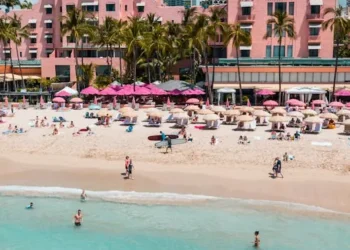The Glastonbury Festival Controversy: A Turning Point for Tourism and Diplomacy?
The recent uproar at the Glastonbury Festival, sparked by Bob Vylan’s anti-IDF chants, has ignited debates far beyond the festival grounds. What began as a musical performance has now escalated into a discussion about global tourism, international relations, and political tensions—particularly between the UK and Israel. Could this controversy influence traveler sentiment, event safety, and even diplomatic ties?
Why the Glastonbury Incident Matters
Glastonbury, one of the world’s most iconic music festivals, attracts over 200,000 attendees annually, including international tourists. This year, however, the event made headlines for reasons beyond its lineup. British punk duo Bob Vylan’s politically charged performance, which included criticism of the Israeli Defense Forces (IDF), has raised concerns about:
- Tourist safety: Could political demonstrations at major events deter future visitors?
- Diplomatic fallout: How might this impact UK-Israel relations, especially in tourism and cultural exchange?
- Event organizers’ dilemmas: Balancing artistic freedom with geopolitical sensitivities.
The Ripple Effect on Global Tourism
Festivals like Glastonbury are economic powerhouses, generating millions for local economies and global travel sectors. However, controversies tied to political statements can have unintended consequences:
- Perceived risks: Travelers may avoid destinations where protests or unrest could disrupt plans.
- Government advisories: Countries like Israel might issue warnings or alter travel policies in response.
- Cultural boycotts: Calls to boycott events or destinations over political stances could emerge.
Navigating the UK-Israel Tourism Landscape
The UK and Israel share robust tourism ties, with over 200,000 British tourists visiting Israel annually. However, incidents like this could strain relations:
- Diplomatic tensions: Israel’s government has previously criticized UK-based protests, potentially affecting bilateral tourism agreements.
- Tourist sentiment: Social media amplifies controversies, influencing travelers’ perceptions of safety and inclusivity.
- Event security: Festivals may face heightened scrutiny, impacting budgets and logistics.
Looking Ahead: A Delicate Balance
While Glastonbury has always been a platform for free expression, this incident underscores the growing intersection of entertainment, politics, and tourism. Moving forward, stakeholders—from governments to event planners—must weigh:
- Risk management: Proactive measures to address safety without stifling creativity.
- Dialogue: Encouraging cross-cultural understanding to mitigate polarization.
- Transparency: Clear communication with tourists about event policies and potential disruptions.
As the dust settles, one thing is clear: In an era where art and activism collide, the travel industry must adapt to navigate these complex dynamics—without losing sight of its core mission: bringing people together.







